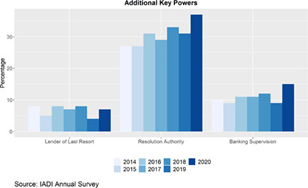Individuals with deposits at insured institutions are covered by deposit insurance
According to Article 4 of the Law on DI, insured depositors are individuals who have insured deposits with insured institutions. So, what types of deposits are announced?
Insured deposits are defined in Article 18 of the Law on DI. posited, insured deposits are deposits in Vietnamese Dong made by individuals at insured institutions in the forms of time deposits, demand deposits, savings accounts, certificates of deposits, bills, notes, and other types of deposits as stipulated in the Law on Credit Institutions, except for the following types of deposits:
- Deposits at credit institutions made by individuals who own more than 5% of the total chartered capital of those credit institutions.
- Deposits at credit institutions made by individuals who are members of the Board of Directors, the Board of Supervision, General Directors (Directors), General Deputy Directors (Deputy Directors) of those credit institutions; deposits in branches of foreign-owned banks of individuals who are General Directors (Directors), General Deputy Directors (Deputy Directors) of those branches of foreign-owned banks.
- Investment in unnamed bills or notes issued by public institutions.
Depositors are entitled to receive insurance payments in accordance with regulations and within the specified timeframe
When insurance payment duty arises, depositors are entitled to receive insurance payment up to the maximum coverage limit prescribed in Decision No. 32/2021/QD-TTg on the deposit insurance coverage limit. formation, the amount that the Deposit Insurance of Vietnam (DIV) pays for all insured deposits (including principal and interest) of an individual at an insured institution when insurance payment duty arises is VND 125,000,000.
Depositors also have the right to receive insurance payments on time as prescribed in Article 23 of the Law on DI. Thus, within 60 days from the date when insurance payment duty arises, the DIV shall be obliged to make insurance payments to the deposited depositors.
The date when insurance payment duty arises is prescribed in Article 8 of Circular No.24/2014/TT-NHNN issued on September 6, 2014, guiding some contents on DI as follows:
The insurance payment duty arose from the time the State Bank of Vietnam issues a document on the termination of special control, or a document on termination of application, or a document on the non- application of measures to restore solvency and the insured institution is still bankrupt, or the State Bank of Vietnam issues a document identifying a foreign bank branch, which is an insured institution has lost its ability to make payment to the depositors.
The document on termination of special control or the document on termination of application or non-application of measures to restore solvency regulated in Clause 1, Article 8 of Circular No. No.24/2014/TT-NHNN must clearly state that the CI is unable to restore solvency (becomes bankrupt) as a basis for the deposit insurance reimbursement.
Depositors have the right to request the institute and the DIV to provide comprehensive and accurate information about the DI regime
Depositors have the right to request the institute and the DIV to provide comprehensive and accurate information about the DI regime, including these basic contents:
- Insured/uninsured depositors.
- Insured/uninsured deposits.
- Deposit insurance coverage limit.
- Insurance payment amount.
- Location, time and method of payment.
- Procedures to receive insurance payment.
- Special cases such as multiple owners, publicized depositors having debts at public institutions, etc.
When the insurance payment duty arises, the DIV must publicly announce the location, time, and method of payment on three consecutive issues of a central newspaper, a local newspaper where the head office and branches of the institute are located and on an electronic newspaper of Vietnam; and display the lists of the public depositors who shall be paid at the announced venues.
However, Clause 6, Article 26 of the Law on DI also stipulates that after 10 years from the date the DIV first announces the insurance payment, the insurance amount with no recipients shall be put under State ownership and added to the DIV's operational capital, and the owners of those deposits will not have the right to request the DIV pay that insurance amount.
Depositors have the right to complain, denounce, and prosecute the agencies, organizations and individuals involved in the DI in accordance with the law
Depositors have the right to complain, denounce, and prosecute the agencies, organizations, and individuals involved in DI for violating the Law on DI. The legal provisions on DI are those stipulated in the Law on DI and related documents.
Prohibited acts and violations of the Law on DI are stipulated in Article 10 of the Law on DI, including:
- The insured institutions failing to pay the DI premiums.
- The DIV refuses to make payouts or making insufficient payouts.
- Cheating and forging records, documents, and papers relating to DI.
- Obstructing, causing difficulties, or damaging the rights and legitimate interests of the DIV, announcing institutions, announcing depositors and involved organizations.
- Abusing of authorizations or powers to act against the legal provisions on DI.
The settlement of claim, denunciation or lawsuit is stipulated in Article 36, Law on DI:
- The competent authority for settlement of first time claim regarding DI is the DIV. The time frame for settling claim by the DIV is 15 days from the date of receipt of the claim.
- In case that the claimant does not agree with the decision on the first time claim settlement or when the prescribed time limit for claim settlement elapses without resolution, the claimant is entitled to appeal to the Governor of the State Bank of Vietnam.
The Governor of the State Bank of Vietnam assumes responsibility for settling the claim within 30 days of receipt. If the claimant does not agree with the decision of the Governor of the State Bank of Vietnam on claim settlement, the claimant shall have the right to sue in court as stipulated by applicable law.
Depositors are obliged to provide complete and truthful information regarding their deposits
In order to receive insurance payment when the insurance payment duty arises, depositors are required to provide complete and truthful information regarding their deposits. Thus, in addition to personal documentation, Clause 4, Article 26 of the Law on DI prescribes that upon receipt of insurance payment, the insured depositors must show written evidence for the legitimate ownership of their deposits with the insured institution, such as savings cards , certificates of deposit, etc.
In case the depositors misplace savings cards or certificates of deposits, confirmation procedures must be adhered to in accordance with legal regulations before proceeding with the receipt of insurance payment.
When depositors are aware of their legitimate rights and obligations regarding DI, they can confidently deposit their money at public institutions. At the same time, this strengthens their faith in the credit institution system, promotes capital mobilization, prevents bank runs, and contributes to the safe and sound of banking operations.
Department of Research and International Cooperation (translation)



























